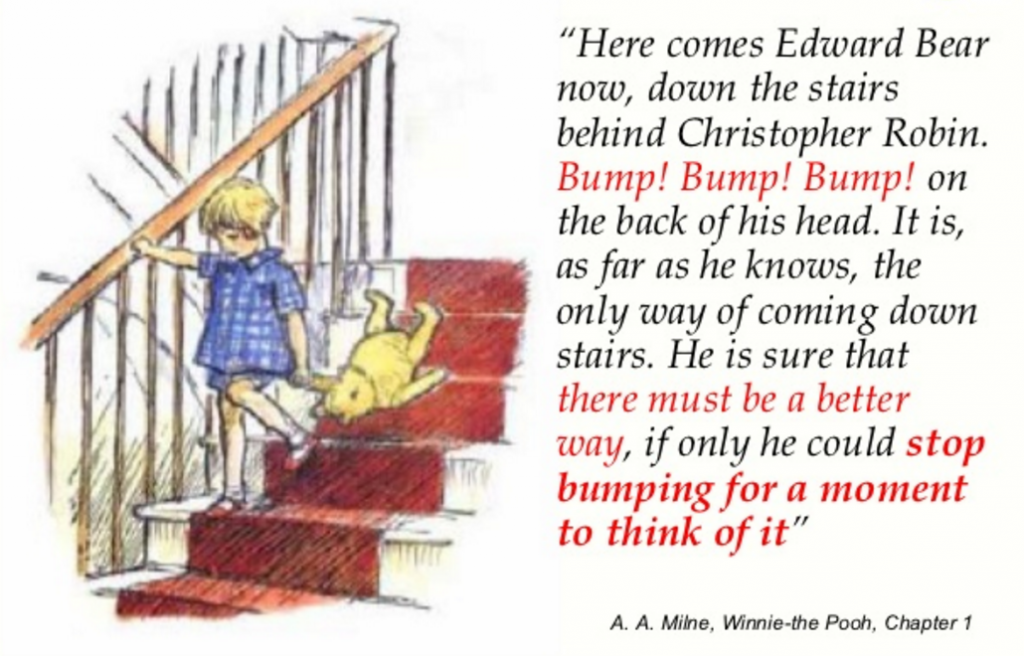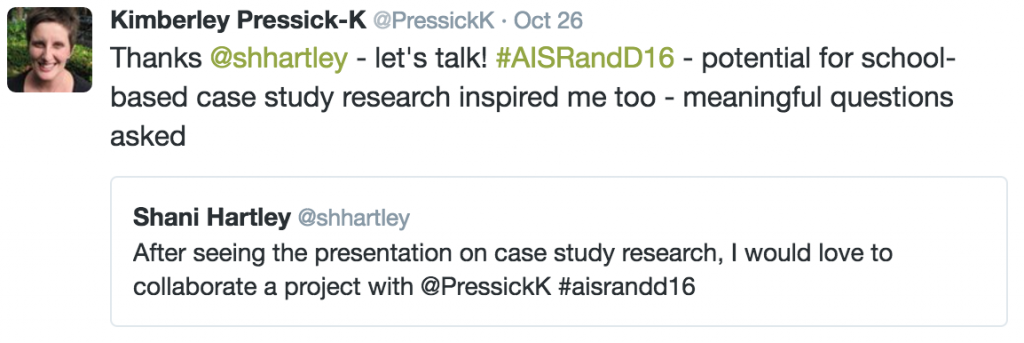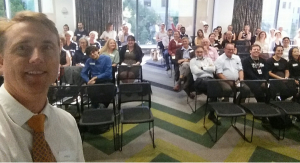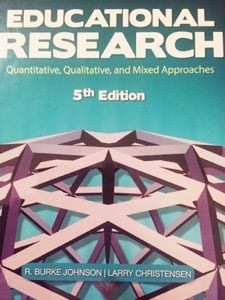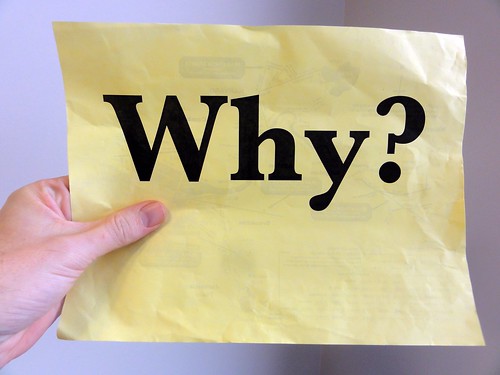Image by Mikel Ortega at https://www.flickr.com/photos/mikelo/217048717
Last week I attended the AIS Education Research Symposium. When I worked at Oakhill College I was part of the team that created and implemented REAL (Relevant Engaging, Active Learning) and then we researched its impact. Unfortunately I left Oakhill before the end of the two year research project but thankfully I remained involved to an extent. We designed REAL to create a paradigm shift in the teaching and learning environment at the school through a transparent curriculum in a detailed but clear (student-friendly) format, structured for students to know each lesson or week:
- What is to be learned
- How it is to be learned, and
- The evidence of successful learning
The research project examined the impact of REAL on student outcomes but effectively discovered the effect it had on teachers too. The research revealed REAL as a significantly successful program, although teachers found it hard to adapt their practices, and I’m proud to have been associated with it.
But this post is about the symposium. The main participants at the symposium are from schools that have received a funding opportunity from AIS and are at the start, middle or end of a two year research project. It is also for any other teachers who are keen to make stronger links between research and teaching practice. And the first keynote speaker, Dr Stacey Waters, was exactly on this topic.
It is extremely hard to make a cultural shift in any institution, let alone a school which has so many entrenched perceptions of what it should be like. Nearly everyone in the world experiences school and our experiences are reinforced by pop culture’s representation of it, this image being a teacher up the front instructing students sitting in rows, resisting the learning process (except when they have a superstar teacher like Michelle Pfeiffer or Robin Williams).
This is not the one best way to learn. Academic research has indicated this repeatedly, yet many schools resist changing (much like their students resist learning). I think part of it is the conflicting voices dominating the discourse of how schools should operate. As mentioned before, there is the entertainment industry image but there is also the political viewpoint that schools must do better, meaning better at publicly published score achievement (PISA, NAPLAN, HSC). In education conference circles there are a few (mainly men) who have a certain popularity, often stringing out their one concept stories for decades (I’m thinking the hole-in-the-wall story and the idea that schools kill creativity).
The academic voice is often lost in all this. There are some who are picked up by politicians and/or the media. For example, John Hattie and his Visible Learning ideal is lauded by politicians and the media. However, even the John Hatties often remain ignored in the day-to-day classroom, for a number of reasons.
Personally I think it stems from a dominating need of isolated teachers in their classrooms to have control and order. Control and order is easier if learning is considered to be the mere accumulation of knowledge. It casts a dark shadow on education. Teaching is better if it is collaborative, learning is better if it is collaborative, but it is much harder to maintain control and order in a collaborative environment when there isn’t a desire to learn in the first place, by teachers or students. It is harder to know what individual students are doing in a collaborative environment and if it is known that they are not participating in the learning process, it is hard to know what to do about them. There are plenty of theories, methods and systems that can be put in place but really, it all comes to dealing with individual motivations and desires to learn. And to be honest, the better learning environments take more time and energy to plan and monitor. I love an active collaborative learning environment in my classrooms but boy, it’s hard work a lot of the time.
Prof Ruth Deakin Crick shared this quote as part of her presentation about the use of technology to change school culture from exam-driven teaching to a learning culture with dynamic pedagogy and engagement (image, however, was clipped from elsewhere):
Teachers are so busy and comfortable with what they know well and what they’ve been rewarded for in the past, they don’t want to become even busier and take risks that result in lost control and disapproval.
So now we can see why some resistance to change exists, let’s return to the academic voice and other reasons why it is difficult to implement research findings into school practice.
To be able to research in a detailed, scientifically credible manner, academics focus on narrow areas to reduce multiple confounding factors in their study. They generally want to discover a cause and effect, and the size of that effect, but to be specific and certain they can only concentrate on one cause and one effect at a time, whereas education is much much more complicated than that. It is like reducing economic modelling to two products in the market. It illustrates a concept but an economy with just two products is not real life. This is why Hattie’s study is so appealing, it throws hundreds of studies into the mix and calculates which causes have the most effect. However, one point worth noting, is how long this all takes. A research project can take years, and then months to write and publish in an academic journal, and then even longer to garner the attention of those who it really affects, people in schools. I’m not sure of the age of the studies Hattie includes in his meta-analysis. Due to the narrow focus and time-lags the question was raised at the conference as to whether the academic rigour should be sacrificed, to an extent, to allow more pertinent and practical studies be undertaken in a more timely manner. I don’t know the answer.
The publish or perish pressure on academics is a significant factor too. The money associated with grants often comes with a proviso of what must be researched. Dr Stacey Waters also referred to the Excellence in Research for Australia (ERA) system which awards points according to the category of grants. To be published, it helps if the research is something new and different, rather than going deeper into something that has already been examined. The dream situation for an academic though, is selling books. And books sell if they have something novel and easy to implement. We all know how hard change management is, but just how many books advocate just ‘x’ number of steps (eg Kotter’s 8 steps) like it is a simple linear process? It’s not.
Even if academics find something that is commonly considered important to implement in schools, the process is slow and usually ineffectual. Researchers are already balancing teaching and research and then they need to market their findings so that schools will take their ideas on board, when so many ideas are already present. Dr Stacey Waters says that publishing and even training people is not enough. One of her presentation slides said:
Implementation is most successful when…
- Practitioners receive training and coaching
- The organisation provides the necessary infrastructure for training and coaching and regularly evaluates
- The community is fully involved in the selection and evaluation of programs
(Fixsen, Naoom, Blasé, Friedman & Wallace, 2005)
She argued that schools should build relationships with universities and establish a research culture by providing easy access to academic journals and having a forum to discuss what these journals have to say.
Before Oakhill obtained the research funding opportunity from AIS, we asked some universities to help us perform academic research. We discovered that not only did they want to be paid consultation fees, that some even wanted to virtually take over the whole process. We backed away quickly and were relieved and grateful to receive the AIS funding opportunity. As part of the inaugural recipients of research funding there was only minimal guidance but still, some important structural requirements, including an academic advisor. However, we ended up only spending 50% of the budgeted amount we allocated for the advisor. He was extremely helpful for implementing research that produced quantifiable data and how that data could be used, but partly due to how late we were and partly due to the lack of need, we didn’t use as much of his services for the writing part as we thought we would.
So here we were at a conference that was bringing together academics and teachers, albeit those already interested in research. As Terrie Jones tweeted, “Teacher practitioner researchers in partnership with academics bridging the research practice divide? This room. #AISRandD16”. One of the sessions I enjoyed the most was about Case Study as a form of research. From what little I have been involved in research at a tertiary level, I have found case study methods frowned upon because it is not appropriate to extrapolate something that works in one circumstance as being applicable to a wider range of circumstances. Dr Kimberley Pressick-Kilborn argued that yes, three case studies are better than one, but much can be learned from them and proceeded to demonstrate how powerful they could be but also recognising their limitations. I tweeted that I’d love to work on a case study with Dr Kimberley and she responded with a “Let’s talk” which I will probably take her up on some time next year (see screen grab below). However, I’m not looking to do research like this until at least 2018. I started a Master of Research (MRES) at Macquarie University this year but stopped just a few weeks in due to lack of time. I’m currently not working full-time so I can help my son through his HSC (he has autism and anxiety issues). I considered studying also during this year ‘off’ but I need to make him the priority, not my own work. After that I’ll be open to all sorts of projects!
The people at this conference are the core people of their organisations interested in learning and continuous improvement. What we actually need to learn as researchers within schools, is how to gather-in colleagues to a learning mindset and join with us.
When we first attempted researching the REAL project ourselves, we applied to present at academic conferences in Seville, Spain, and New York, USA, and were approved for both based on our ‘abstracts’. This was before the AIS research funding program even existed and we were without any support from universities. We then had to write papers for these conferences, the New York paper being subject to a peer review. It failed one reviewer but the other advised us to change the format significantly, which we did, and it was then published <http://shanihartley.cgpublisher.com/product/pub.264/prod.58>*. We also had to review other papers which was a great learning experience for us. At these conferences there was much said about education at all levels but over 90% of the presenters were from universities. Universities seem to take a more hit-and-run approach instead of working in tandem with the schools they research. It would be nice to see or even experience more collaboration between schools and universities in the research process at academic conferences. Perhaps we were better off without a university’s own agenda. We were unusual in being school teachers conducting and presenting our own research. There should be more of it.

